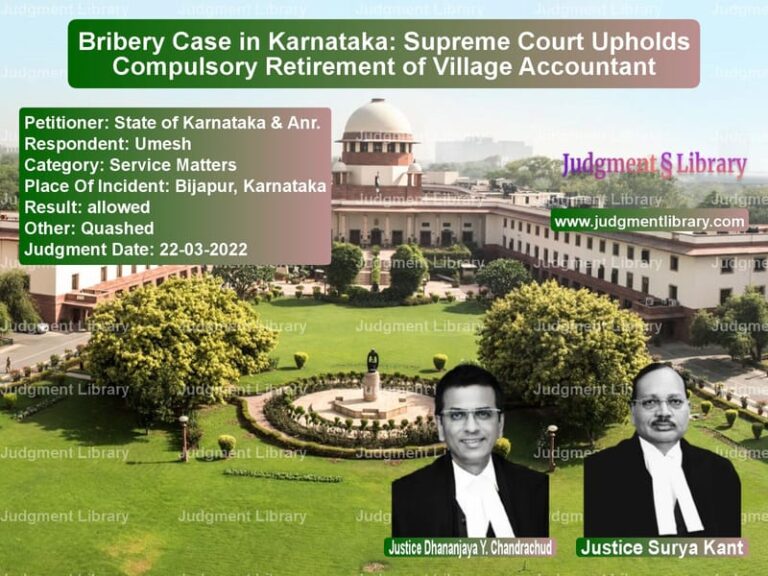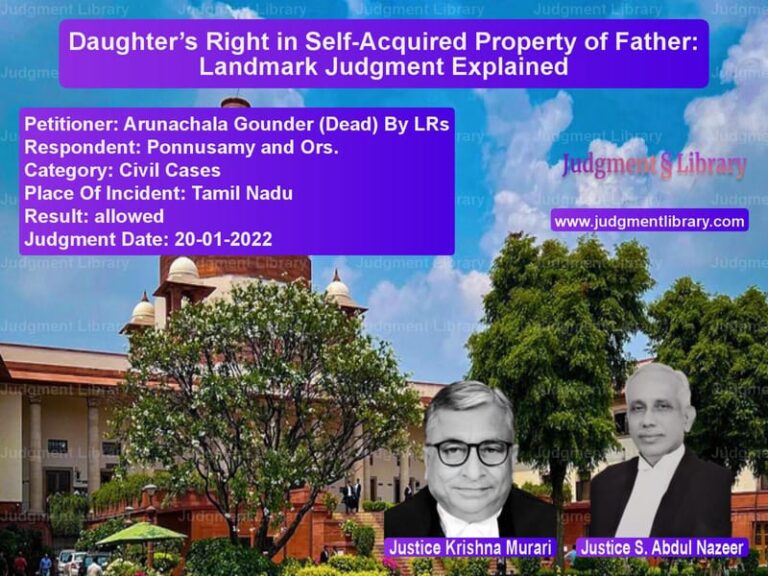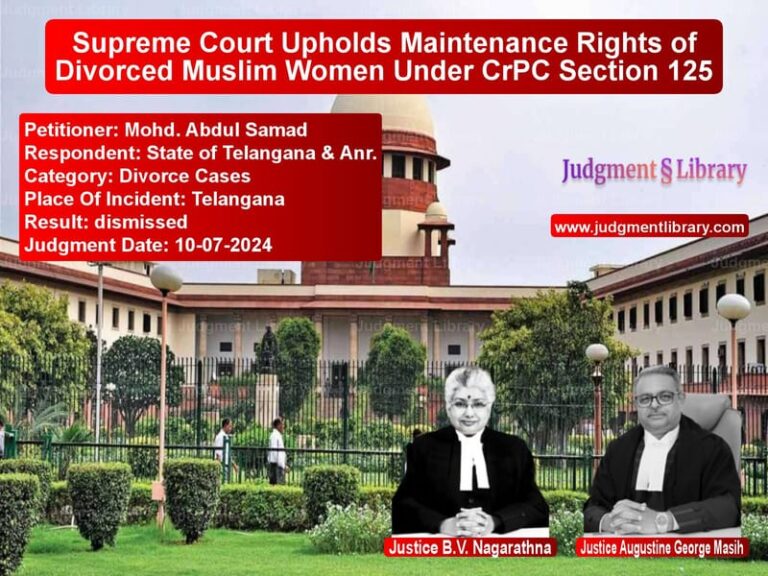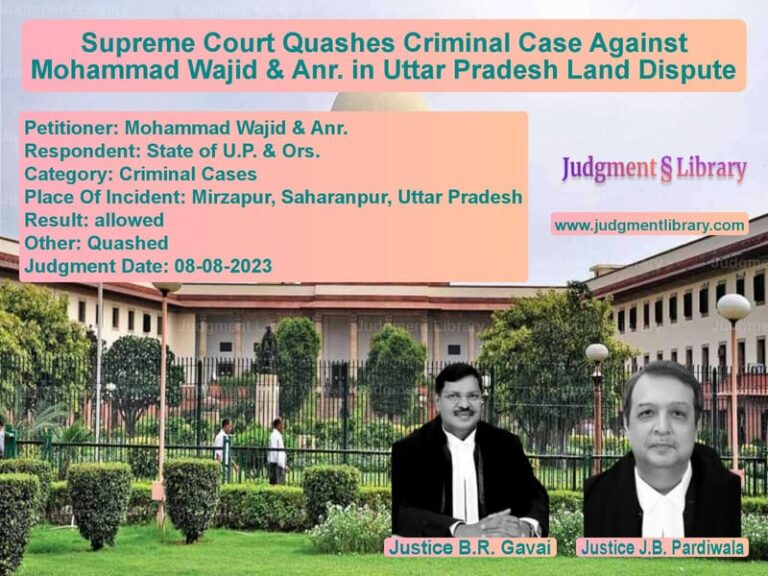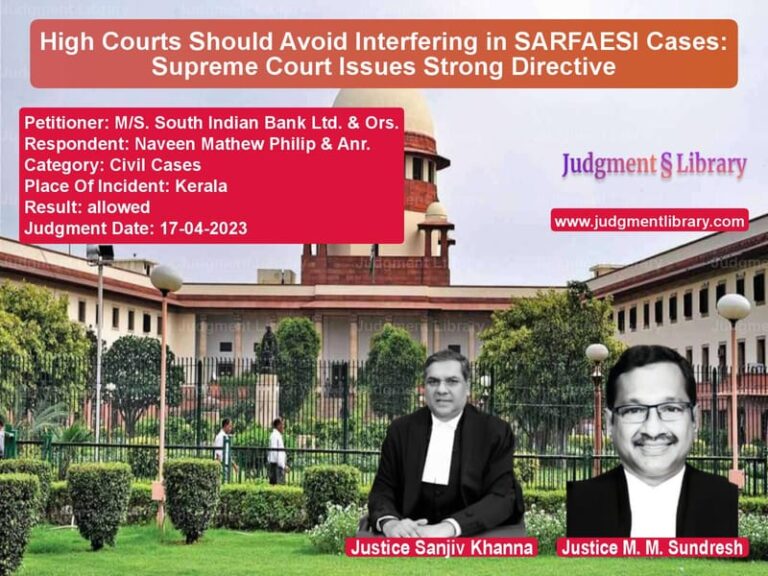Supreme Court Acquits Husband and Sister-in-Law in Dowry Death Case
In a significant ruling, the Supreme Court of India overturned a Bombay High Court judgment in the case of Sampat Babso Kale & Anr. vs. The State of Maharashtra, where the appellants had been convicted under Section 302 and Section 498A of the Indian Penal Code (IPC) for the alleged murder of Sampat Kale’s wife, Sharada. The Supreme Court reinstated the trial court’s verdict, which had acquitted the accused due to lack of evidence beyond a reasonable doubt.
The ruling underscores the legal principle that when an appellate court reviews an acquittal, it must ensure that findings of the trial court are perverse or unsupported by evidence before overturning the decision. In this case, the Supreme Court found that the High Court had erred in interfering with the trial court’s well-reasoned judgment.
Background of the Case
The case involved allegations that Sampat Babso Kale (husband of the deceased) and his sister, Tarabai Dhanaji Dhaigude, conspired to kill Sharada by pouring kerosene on her and setting her on fire due to her inability to conceive a child. The prosecution claimed this act was motivated by the husband’s desire to remarry.
Key facts of the case:
- Sampat Kale and Sharada were married on April 25, 1987.
- They initially lived in Thergaon, Chinchwad, before shifting to MIDC Colony, Pune.
- On the night of July 8-9, 1989, Sharada suffered 98% burn injuries and succumbed to them the next morning.
- The prosecution relied on two dying declarations, one given to Dr. Sanjeev Chibbar and another to Special Judicial Magistrate Mr. Kamlakar Adhav.
- The trial court acquitted the accused, citing inconsistencies in the evidence and the possibility of suicide.
- The Bombay High Court reversed the acquittal and sentenced them to life imprisonment.
- The accused then appealed to the Supreme Court.
Arguments by the Appellants (Sampat Babso Kale & Tarabai Dhanaji Dhaigude)
The defense put forth the following arguments:
- Sharada committed suicide due to stress arising from her unwillingness to live in a rural household.
- The deceased belonged to a well-off family and was unwilling to live with her in-laws in Lonand village, where amenities like toilets and electricity were unavailable.
- The defense questioned the credibility of the dying declarations, highlighting inconsistencies in the recorded statements.
- The trial court rightly ruled in favor of the accused, and the High Court had no justification to overturn the acquittal.
Arguments by the Respondent (State of Maharashtra)
The prosecution countered with the following points:
- The dying declarations provided direct evidence against the accused.
- Both the accused had the motive to kill Sharada due to her infertility.
- The burn injuries could not have been self-inflicted given the nature and extent of the damage.
- The trial court erred in not giving proper weight to the dying declarations.
Supreme Court’s Observations and Ruling
The Supreme Court reviewed the evidence, particularly focusing on the dying declarations and the medical evidence. It emphasized:
“In a case of the present nature where the victim had 98% burns and the doctor has stated from the record that a painkiller was injected at 3:30 a.m., the possibility of her being in a state of delusion cannot be ruled out.”
The Court found the following factors crucial:
- The medical records indicated that the deceased was given a painkiller injection before making her dying declaration, raising doubts about her mental clarity.
- The dying declaration was recorded after the doctor’s certification, rather than before, which was deemed a procedural irregularity.
- The panchanama report confirmed that the fire originated in the kitchen and not in the bedroom, casting doubt on the prosecution’s version.
- The deceased’s ornaments (mangalsutra, bangles, nose ring, and anklets) were found neatly placed under a pillow, supporting the theory of suicide.
- No neighbors were examined as witnesses despite their alleged presence at the scene.
Final Ruling
The Supreme Court set aside the Bombay High Court’s judgment and reinstated the trial court’s acquittal:
- The conviction of the accused under Section 302 IPC was overturned.
- The accused were also acquitted of charges under Section 498A IPC (cruelty against wife).
- The Court emphasized that acquittals should not be interfered with unless the trial court’s findings are perverse or unsupported by evidence.
“The trial court was right in holding that the prosecution had failed to prove its case beyond reasonable doubt.”
Implications of the Judgment
This ruling sets a precedent for reviewing dying declarations and appellate court powers:
- Dying declarations need corroboration: The Court reaffirmed that dying declarations should be scrutinized carefully, especially when the victim is under trauma.
- Reaffirming the trial court’s findings: High Courts should not interfere with an acquittal unless there is a manifest error in reasoning.
- Presumption of innocence: The judgment reiterates that once an accused is acquitted, the presumption of innocence is strengthened.
- Burden of proof: The ruling clarifies that the prosecution must establish guilt beyond reasonable doubt, particularly in cases relying on dying declarations.
The Supreme Court’s verdict highlights the importance of procedural fairness in criminal cases and ensures that mere suspicion cannot substitute for concrete evidence in convicting an accused.
Petitioner Name: Sampat Babso Kale & Anr..Respondent Name: The State of Maharashtra.Judgment By: Justice S.A. Bobde, Justice Deepak Gupta.Place Of Incident: Pune, Maharashtra.Judgment Date: 09-04-2019.
Don’t miss out on the full details! Download the complete judgment in PDF format below and gain valuable insights instantly!
Download Judgment: Sampat Babso Kale & vs The State of Maharas Supreme Court of India Judgment Dated 09-04-2019.pdf
Direct Downlaod Judgment: Direct downlaod this Judgment
See all petitions in Dowry Cases
See all petitions in Murder Cases
See all petitions in Judgment by S. A. Bobde
See all petitions in Judgment by Deepak Gupta
See all petitions in allowed
See all petitions in Quashed
See all petitions in supreme court of India judgments April 2019
See all petitions in 2019 judgments
See all posts in Criminal Cases Category
See all allowed petitions in Criminal Cases Category
See all Dismissed petitions in Criminal Cases Category
See all partially allowed petitions in Criminal Cases Category


